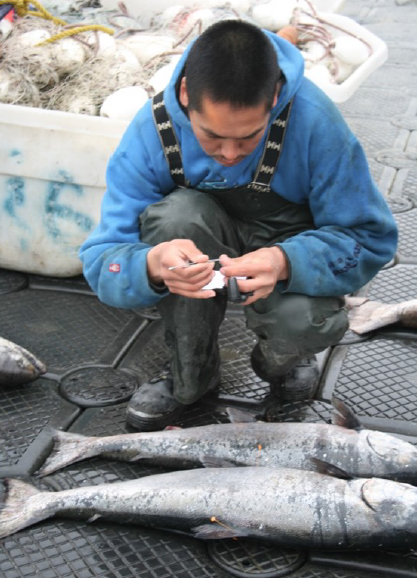
Over the past several years, fishery managers have placed extremely tight harvest restrictions on king salmon fishing in the Yukon River. The hope is that conservation will lead to larger runs. When managers make those decisions – telling fishermen when and where they can fish and what gear they can use – they need to know how those measures affect subsistence harvests; they need samples of the fish. The state is working with subsistence fishermen in a voluntary program to get those samples.
“Currently, we’re restricting fishermen to smaller mesh sizes. We’re also reducing the amount of time they can fish, so it’s really important for us to understand what effects those management actions have on the harvest,” Holly Carroll said. She manages the king salmon run on the Yukon for the Alaska Department of Fish and Game.
Understanding these effects can help guide in-season management decisions and refine management in future years. For instance, last year more males were harvested than females.
“We do find that lately they’ve been using smaller mesh, so they’ve been harvesting much younger fish, which is what we would expect,” Carroll said.
This is the fourth year of the subsistence sampling program on the Lower Yukon.
Collecting biological samples has several steps. First the subsistence fishermen takes a fin clip off each fish.
“Then we analyze the genetic component of the harvest,” Carroll said.
The genes show where the fish hatched and where it was heading.
“And the other metrics we get are length and sex,” Carroll said.
The state also tracks the age of the fish, which is measured by the number of rings on a fish’s scales.
“Each fish has to have three scales come off and onto the scale card, and you have to check that scale and make sure it’s a viable scale,” Carroll said.
In all, each sample takes about five minutes per fish and is completed during processing. The state hopes that more data will lead to better management.
Training sessions with subsistence fishermen on how to collect the samples are beginning this week in Lower Yukon villages. Spearfish Research, a fisheries biology consulting company, will conduct the trainings and explain what makes a scale viable and how to deal with the samples. Subsistence fishermen will receive $10 per sample. Only the samples will go to the state; no personal information, not even names, will be sent.
Training sessions will be held in Kotlik, Alakanuk, Emmonak, Mountain Village, St. Mary’s, Russian Mission, Kaltag, Nulato, Galena, Ruby and Tanana. To attend, contact fisheries biologist Cody Strathe at 907-452-3828 or cody@spearfishresearch.com.
Anna Rose MacArthur is a reporter at KYUK in Bethel.




